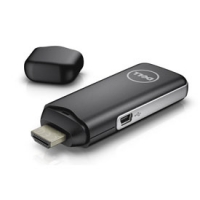No Hard Drive Required: Cloud Connect Takes Unique Approach to DaaS

Multiple software vendors have come forward with their own solutions for the burgeoning desktop as a service (DaaS) trend. Amazon Web Services has WorkSpaces and VMware has Desktone, which has a trademark on the term “DaaS.” Each company is vying for business dollars, with businesses challenged to provide easy-to-use, affordable solutions to companies.
But consumers, too, are keeping an eye on the emerging market. With a personal desktop residing in the cloud, consumers will be free to access their own operating systems from anywhere, using any device. No more data loss after a hard drive crash. No more hours of reinstalling files and software on a newly purchased PC. With desktop virtualization, a user’s operating system, software, and files will remain intact year after year, device after device.
So far, however, this technology has been out of reach for the average consumer. The new Dell Wyse Cloud Connect could change all of that. By simply plugging a flash drive-style stick into an HDMI port on a TV or computer monitor, users can access cloud-stored or physical desktops, along with the apps and files that reside on them.
Using the Android operating system, Cloud Connect is being called a thin client device due to its ability to connect to either Windows or Mac computers. The device retails for $129 and requires a mouse and keyboard for full PC-like functionality.
Currently, Dell is touting the product’s use in the corporate environment. Professionals can get to their secure networks from anywhere, including hotel rooms while on the road. The one caveat is that virtualization has to already be in place, and that virtualization has to be through Citrix, Microsoft, or VMware.
For a small device, Cloud Connect is fairly robust. Requiring no battery, the device contains an ARM-based application processor, eight gigabytes of storage, and one gigabyte of memory. For nonbusiness use, device owners can use it to connect to the Google Play store and enjoy Google Chromecast-like functionality.
The question now is: What does this mean for the future? Considering that Google Chromecast and Dell Cloud Connect offer similar designs, the comparisons aren’t surprising. Consumers can possibly expect similar types of technology in the future as manufacturers work hard to find ways to allow users to access the cloud without needing a hard drive to act as the middleman. Future incarnations may also allow access to desktops through a smartphone or tablet—even removing the need to track down a monitor.

